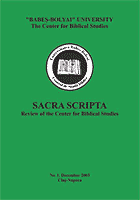Ecumenical Implications of the Authorship of the Pastoral Epistles for the Understanding of Ministry
Ecumenical Implications of the Authorship of the Pastoral Epistles for the Understanding of Ministry
Author(s): Korinna ZAMFIRSubject(s): Christian Theology and Religion
Published by: Universitatea Babes-Bolyai - Centrul de Studii Biblice
Summary/Abstract: The Deuteropauline character of the Pastorals, widely sustained by both Protestant and Catholic scholars, has significant consequences for the ecumenical dialogue concerning ministry and apostolic succession. The terms evpisko,poj and presbute,roj are at the origin two equivalent offices, steming from different ecclesial millieus. The Pastorals express the tendency to harmonise the Hellenistic organisatoric model (evpisko,poi kai. diako,noi) with the Judeo-Christian presbyteral type of church leading, tendency that can be also seen in Acts 20:17,28. The Pastorals do not state a hierarchic differentiation that would point to a monarchic episcopate. Yet we might see a certain institutionalisation and personalisation, indicated by the singular episkopos, which, corroborated with the analogy with the head of the family suggests a specific responsibility. The Pastorals suggest that Paul himself has appointed the responsibles of the communities. Yet this is not a historical fact, if we consider the pseudoepigraphic character of the Pastorals. This assertion is meant to legitimise the new generation of church leaders as authentic depositaries of the Pauline heritage. The fictive character of Timothy and Titus’ ordination by Paul does not deny the importance of the ministerial continuity. On the contrary it proves that at the end of the first century the Christian church highly values fidelity to apostolic teaching, and considers this fidelity as being guaranteed precisely by the continuity of those having a special pastoral responsibility. The Pastorals connect the transmission of this responsibility with the rite of the imposition of hands. The improbability of Timothy and Titus’ immediate ordination by the apostle himself, together with the equivalent meaning of episkopos and presbyteros, shows that the theological argumentation in favour of the apostolic succession prevails over the historical evidence. This fact invites Catholic and Orthodox theology to a more nuanced evaluation of the ministry of those churches that have not kept the episcopal succession. But we also have to say that the episcopal structure, through its history and its importance for the transmission of Christian teaching, in fidelity to the apostolic tradition, cannot be considered a mere arbitrary construct without actual meaning. Yet precisely the fact that the formation and evolution of ministries is a historical process and an answer to specific pastoral demands draws the attention to the openness of ministry, required in front of pastoral challenges.
Journal: Sacra Scripta
- Issue Year: II/2004
- Issue No: 1
- Page Range: 153-166
- Page Count: 14
- Language: English
- Content File-PDF

